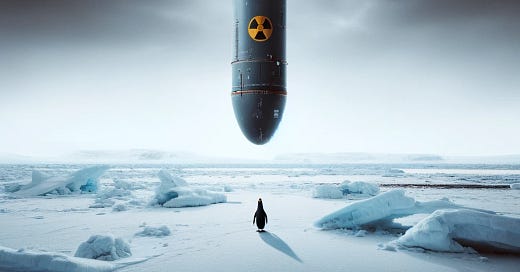The U.K has now suffered two successive testing failures of its Trident missile system. In the 2017 test, the missile successfully launched but reportedly headed towards the U.S, which was not in fact the desired destination. The missile was remotely destroyed in flight, lest the Royal Navy unexpectedly create a new bunker next to the 13th green at Augusta. In the second test, the missile successfully launched, but the first-stage boosters failed to fire and the missile sank. According to the Sun’s source, “it just went plop”.
The U.K has not conducted a successful Trident test since 2012. The missiles are shared in a pool with the U.S, which has conducted successful test firings, most recently in 2023. While this rules out the possibility that the entire missile stock is defective, it does not rule out the possibility that something is going systematically wrong with the interaction between the Trident missiles and the Vanguard submarine type. At a cost of £17 million per missile, however, the MoD is apparently in no hurry to conduct a much larger-scale test.
Although it remains unclear if the UK can reliably fire its missiles, at least they are tested every 5 years or so. The Holbrook warheads on the top of them, however, have not been tested at all since 1991, in Nevada. Afterwards, the UK signed the Comprehensive Test Ban Treaty in 1996, and ratified it in 1998. Neither the U.S nor China has ratified CTBT.
This existing stock of warheads is coming to the end of their lives and a replacement model needs to be developed. The Holbrook type was a derivative of the American W-76 and it appears that once again the U.K plans to at least partially piggyback on the U.S, which plans to replace its current generation of warheads with the W-93 design. Some combination of computer modelling and data derived from the live tests conducted many decades ago is supposedly sufficient to ensure reliability.
The absence of public or political debate on the wisdom of this arrangement is startling. From a fleet of four, the UK keeps just one submarine at sea as its continuous at-sea deterrent, with just 40 warheads aboard. Meanwhile, the conventional force is not-so-slowly entering a state of long-term collapse, with the Navy and Army both shrinking rapidly and the Air Force entering a suicidally stressful decade for its budget. In that context, the U.K plans to spend many tens of billions to maintain and replace a nuclear deterrent composed of missiles that have repeatedly failed in tests and warheads that will never be tested at all, all carried by a submarine that represents one single point of failure. One need not be a Treasury official to wonder if this arrangement really represents good value for money.
Perhaps, prior to spending the billions, the U.K should withdraw from CTBT, conduct live tests of the new warhead, and pick a particular fat penguin as a suitable target for a large-scale missile test. The war in Ukraine, a sharp reminder of just how much has changed since 1998, would surely give ample political justification for such measures. Successful tests of the new warhead would themselves exert a considerable deterrent effect.
The war also serves as an illustration of the non-credibility of the conventional force. It is too small and too brittle, and the industrial base to replace inevitable equipment losses is practically non-existent. Munitions stockpiles would be exhausted in days of any large conflict, and the U.K also lacks the tactical nuclear weapons that might allow for a very deadly, if risky, response against a much larger conventional force. Attrition would instead rule the day, as it has for much of the ongoing war.
Despite massive attrition, both Russia and Ukraine have been able to continue the conflict due to historic stockpiles, large-scale industrial production at home and abroad, and substantial reserves of semi-trained manpower thanks to decades of conscription. If the U.K wants the kind of credible conventional force that could endure despite attrition, and that might make skimping on the nuclear deterrent more acceptable, it should end the all-volunteer professional Army and reintroduce a yearly draft, coupled with huge subsidies for domestic industrial defence production.
For all kinds of political and economic reasons, this will never happen and everyone knows it. For many decades to come, Britain will instead be forced to rely for its ultimate security on allies and the bomb. Given this reality, it is surely vital to really make sure that the thing actually works. Rather than asking prospective candidates for the role of Prime Minister about their commitment to using the nuclear deterrent in a crisis, a question that will only ever receive an uninteresting answer, the wise and eminent members of the press who read this publication would be better advised to ask how we can ensure the bomb will definitely go off, if needed.



